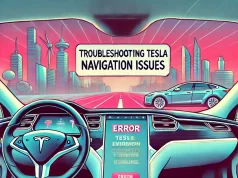Tesla Vision is the name of the company’s camera-based Autopilot system, which uses a powerful set of vision processing tools to provide 360 degrees of visibility and advanced safety and convenience features for Tesla vehicles.
How does Tesla Vision work?
Tesla Vision relies solely on cameras to perceive the environment and make driving decisions. It does not use any radar or ultrasonic sensors, which are common in other vehicles.
Tesla Vision uses a neural network that processes the images from eight cameras around the vehicle and generates a high-definition representation of the surrounding space, objects, and events.
This network also replaces the inputs generated by ultrasonic sensors and gives Autopilot high-definition spatial positioning, longer-range visibility, and the ability to identify and differentiate between objects.
Why did Tesla switch to Tesla Vision?
Tesla switched to Tesla Vision because it believes that this is the best strategy for the future of Autopilot and the safety of its customers.
According to Tesla, this transition was motivated by the incremental improvements achieved with Tesla Vision and the confidence that this is the best way to achieve full self-driving capabilities.
Tesla also claims that radar and vision disagree sometimes, and that vision has much more precision, so it is better to double down on vision than do sensor fusion.
When will Tesla Vision be available?
Tesla Vision is not yet fully available for all Tesla vehicles and regions.
As of early January 2023, only Model 3 and Model Y built for certain regions, such as North America, Europe, the Middle East, Taiwan, and Korea, are no longer equipped with ultrasonic sensors and rely solely on Tesla Vision.
Tesla plans to continue this rollout with Model 3 and Model Y globally over the next few months, followed by Model S and Model X throughout 2023.
What are the limitations of Tesla Vision?
Tesla Vision also comes with some temporary limitations or inactivation of some features that rely on ultrasonic sensors, such as Park Assist, Autopark, Summon, and Smart Summon.
These features will be restored via a series of over-the-air software updates once they achieve performance parity with today’s vehicles.
All other available Autopilot, Enhanced Autopilot, and Full Self-Driving capability features will be active at delivery, depending on order configuration.
What are the benefits of Tesla Vision?
Tesla Vision is a key component of Tesla’s vision statement, which is “to create the most compelling car company of the 21st century by driving the world’s transition to electric vehicles”.
By using innovative technology and artificial intelligence, Tesla aims to accelerate the advent of sustainable transport and achieve full self-driving capabilities.
Tesla Vision is expected to improve rapidly over time with continuous software updates and data collection from millions of Tesla vehicles on the road.






